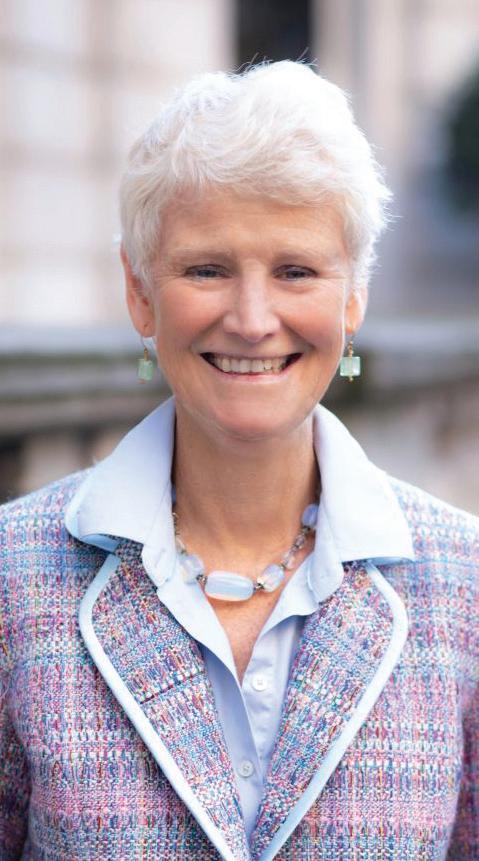
20 minute read
Big question: Esports
Andrea McGeachin Andrea McGeachin, Chief Commercial Officer, Neosurf
Esports became a lifeline to swathes of lockdowners and quarantiners during the pandemic. Not because they enjoyed the isolation, quite the reverse. The world of esports became the valuable daily community that was accessible to them, providing human interaction, mental stimulation, challenge and, more important than anything, enjoyment in dark times.
And it’s the enjoyment that has accelerated the volumes of esports players exponentially over the past two years. Data tracking at Neosurf shows a 38% increase in transactional deposits to the ewallet by the gamers playing, as well as a 42% increase in use of vouchers by the same.
There are no signs that the growth trajectory will not be maintained in the post-pandemic era, and there are five key reasons for this: – Firstly, esports was already a recognised mainstream activity; lockdowns just gave more time and space for people to play, pay and game. Universal recognition has been one of the main beneficiaries of the pandemic. The numbers were already enormous before. The adoption of payment methodologies is now seen not only as safer payment solutions, but as part of the whole esports experience. There are no indications that universal recognition will do anything other than continue to fuel growth in the future. – Secondly, the emergence of esports from ‘gamers-only community’ to ‘full ecosystem’ within the gambling space is what has grown in the gambling sector. The general drive to digitisation that was experienced across many sectors was equally felt in esports, and we now have generations of people comfortable with the concept of digital as opposed to physical. If anything, this applies to esports more than any other area and is a trend that is likely to sit behind further exponential growth in esports in the coming years.
Thirdly, professionalism has arrived, and with it the financial gains on offer to the high-level winners. History has shown that money is one of the main motivators of proposition growth and, fuelled by the trend of mega payouts in mainstream sport, esports has an embedded foundation on which to flourish. The launch of the Olympics Virtual Series this year should leave no one in any doubt that esports is at the starting line and not the finish line.
Penultimately, technology has two angles: the ability to develop and the money to do it. Both stand to serve esports well. The old adage of ‘it takes money to make money’ sits well with the prize money, the investment and sponsorship ready to align itself with what is seen as a huge growth opportunity. And with money predictably will come the
technological developments with the more and more captivating, quality, challenging and irresistible titles that will adopt ‘Apple’ status and a similar following.
Finally, education benefited, eventually, from the pandemic, with rapidly developed distance learning models. The education agenda has started to make good use of esports in these models. So, we now have education not only adopting digitisation, but also esports as a means of capturing and retaining the interest of learners. Put more directly, we are educating future generations in esports as a way of life, as well as infusing them with technological excellence and enticing them with the prospects of monetary gains.
There is no other outcome likely to make growth in esports even more energised than we saw during the pandemic. The agenda that Neosurf has in this journey is to be at the heart of it, genuinely positioned as a key part of the ecosystem.
Andrea McGeachin entered payments in 2007, and has been working at a senior level in the online gambling sector since. Andrea heads up the Neosurf Commercial team, which since 2016 has grown exponentially, filling the gap from Ukash loss as well as driving further and more smart services for our clients as a strong APM solution.
ALL YOU NEED IS BALANCE

Brigid Simmonds, Chair of the Betting & Gaming Council, catches up with Tim Poole to discuss how alcohol and gambling compare, advertising, social media abuse and driving industry change

To go back a little bit in terms of your career, you worked quite a lot in the alcohol industry, can you tell us some more about your background? For 10 years I was Chief Executive of the British Beer and Pub Association, but before that, for 17 years, I ran something called Business in Sport and Leisure, which again was talking with politicians. It was wider, there was a bit on the gambling side, and on the alcohol side, but it was also about watching sport, which is my passion. It did planning and it did employment, which I think are important too.
How does working in alcohol and gambling compare? It’s quite an interesting starting point. When I started with the beer and pub sector, they’d slightly lost their way with government and seen endless increases in tax. We had Gordon Brown, who was Scottish, so whiskey got a good deal, but nobody else got one. I think we reintroduced them to believing that pubs are quintessentially English, you’re better off drinking at a pub because someone is looking after you than doing it on the riverbank, and that the average politician has 53 pubs in their constituency. There are enormous amounts of pubs and brewing is [a big industry]. Even if you’re Heineken, you brew in the UK.
So I think we moved that dialogue on. We need to do the same for gambling. I believe that alcohol and gambling are both things that people choose to do in their leisure time. As long as you drink responsibly, you gamble responsibly and moderately, there is nothing wrong with that. I have a slightly different view about tobacco. I have never worked in that because it’s just bad for you, but the alcohol and gambling industry are actually quite similar. We need to work hard to make
sure that we are playing our part, but we also need the government to work with us and help us to do that.
What has alcohol got right, in terms of advertising, but also in terms of public image, that maybe gambling can learn from? The advertisements became really quite fun. You look at some of the advertisements, for example Diageo’s, and they’re clever. I think some of our advertisements need to be clever as well, but alcohol is quite a competitive market and quite a mature market, which I think means you get competitive advertisements. When we launch our replacement for ‘when the fun stops, stop’, we’ll have something generic that goes with that, and we’ll expect our members to remove the current one and put our new strapline on it.
You mentioned the replacement for when the fun stops, stop, do you have any thoughts on the Tap Out ad, the Bet Regret one with the big wrestler? I was a trustee of GambleAware, when I was at the BPA, so I know quite a lot about it, and I actually sat on the board of Bet Regret. I’m probably not the right person to ask that question of because I’m not the audience they’re after. I think they did their own research just as we’ve done our own research on our new campaign, and you have to listen to what consumers say — what people say — who do gamble, and gamble on a very regular basis. It’s easy to stand on the side-lines and throw stones.
How do you balance praise from the industry with the constant anti-gambling campaigning you’re inevitably going to get? To be honest, there are some people out there that are simply anti-gambling, They may claim that they’re not, but they are. Whatever I say or whatever the industry does, they’re never going to be satisfied. I don’t believe in prohibition, it didn’t work in the States in the 1920s, and it won’t work here. What you need is balance. I hope we are putting forward something that is balanced with lots of facts and lots of information. We do get some praise. Last Saturday, we won an award from the three armed forces because of the money we raised from the Britannia Stakes at Ascot last year. I think we raised £1.2m ($1.6m).
There are people out there who appreciate the work we’re doing, but you do have to take a balanced view of it and sadly, there are some people who don’t feel able to do that. I think you also need to understand what a complicated subject this is. In beer, there isn’t a black market, apart from a white van man going around and delivering to the back of a pub, but it’s not there really. In gambling, there is clearly a black market. We know from the work we’ve done with PWC, that the numbers of people taking part in the black market has increased. We want to make sure that doesn’t happen, and I don’t think sweeping it under the carpet and banning it all is the answer. We just need to make sure we have the regulated industry. I read a lot of things that people say that just do not reflect the industry we are today and the progress we have made in the last two years.

Brigid Simmonds
When you read something like that, do you just have to get on with the job and ignore it? It’s a bit like ignoring all of the people who abuse me on Twitter. No matter what I say, even if it’s something innocuous, they find some reason. I’m quite good at ignoring those sorts of things and I don’t really react. I believe that if you’re going to say things to people, you should think about whether you’re going to say them to their face. If you’re going to put it just in an online context, then I don’t think that’s the right thing to do. I have my own standards of behaviour and I try to talk about facts and what the industry is doing. What it needs to do is absolutely clear. We’re not perfect yet, but going forward we’re not targeting vulnerable customers.
When the Football Index saga was first bubbling on the surface, I wrote a news article about it and got abused for it. BGC CEO Michael Dugher has come in for flak for hitting back at Twitter abuse. I think, in the heat of the moment, people can say things that they regret afterwards. But Football Index is not an area that we work in. Reading the report that the Government came out with, it was as much an FSA regulated issue as it was with the Gambling Commission, but we weren’t involved in that in any way, shape or form. It’s not my role to comment on how businesses work commercially, that’s just not what the trade association is there to do. What we are there to do is promote best practice.
In terms of your members, which are the ones that drive industry change the most? I won’t name companies, but what I will say is that I have been really pleased at the engagement we’ve had from our members. Obviously, larger members have more people and more time to engage in these sorts of things, but all of our members are engaged. We do have very clear rules of membership at the BGC, and that people have to abide by these codes. The engagement has been really good. When I was interviewed for the job, I met the chief executives and said I’m not going to do this unless a) you’re prepared to work together, and b) you will put safer gambling at the heart, and I think they do that.
If someone were to say to you that the BGC is just seen as a mouthpiece for the industry, what would be your response? The Trade Association is there to collect the views of our members. A lot of what our members say is very technical, and it is our role to put it into plain English, and to put it into something so that everybody understands what we’re trying to do. I don’t think we’re a mouthpiece. Our members understand what they’re doing, I just think that in many cases, it’s possibly better that what they’re saying to us is what we say publicly, rather than them saying it directly.
HELICOPTER VIEW
With the departure of former CEO Richard McGuire and CFO Tom Hearne, Gambling Insider speaks to Sportech’s new leadership, CEO Andrew Lindley and CFO Nicola Rowlands
Hi Andrew, Sportech’s H1 2021 interim results show a significant increase in wagering handle since pre-pandemic. What is the main strategy for the business moving forward? Andrew Lindley: The main strategy of the business leading up to now has been to tidy up the whole Sportech model with a view to reducing the size of the business. This also includes reducing the cost base and getting it to a set of manageable businesses with good potential for growth, rather than necessarily nursing some of the older businesses which require significant investment. The Football Pools were sold some years ago, more recently we have divested ourselves of two other businesses, and that leaves us with two or three core competencies. One of which is the venues business in Connecticut, the other is our lottery technical supply, and the other is online retail, again centred in America, which is pari-mutuel only. The venues business has always had the opportunity of being licensed for sports betting, and we have kept hold of that business in anticipation of receiving a licence and powering Connecticut with sports betting as the new and hot product.



What are the biggest challenges Sportech has faced (aside from the pandemic)? AL: We obviously had a disappointment in the middle of the year when we were told we wouldn’t be getting a sports betting licence of our own, but we have worked very hard with the third licensee in the state and the three licensees are the two enormous tribal casinos in Connecticut. We’ve managed to partner with the equally sizeable Connecticut Lottery Corporation (which is a very, very pleasing result for us) to offer their sports betting product in our venues, which will give our venues the opportunity for growth and sustainability for the long term. So one of our key operational focuses is getting that right and making that an operational beacon across America.

What are the achievements and attributes that are making Sportech successful? AL: The lottery business is a UK-based technical business, in Chester. We have a young team of dedicated engineers there who have a very modern cloud-based platform for omni-channel gambling. Our own proprietary lottery vertical stands as the core tenet of that platform, albeit the platform has capability to run any vertical in the gambling space, and we expect to take that product forward into the market – and grow the business with that.
Then we have the online retail in America, MyWinners, which is Connecticut-based and is the online retail element of the venues business; and largely serves the Connecticut market. We also have another brand called 123bet which serves the rest of the American market to the extent that it’s available, which is quite a lot of the States but not all of them.
We have seen some good growth in particular in the online piece in the last year or so with Covid. One of the core opportunities is to continue that growth going forward. And that, in terms of operations and strategy, is the helicopter view of the interim presentation. Nicola, could you please run through the headline numbers? Nicola Rowlands: Sportech revenue stands at £13.4m (£18.54m) which is 70% up on last year, but obviously last year was Covid-stricken so that explains the increase. We are getting back toward 2019 levels; we are not quite there yet but the recovery is definitely almost there. Bottom line profit and loss saw a £24m profit, mostly due to the profit on disposals, so the consideration and the proceeds from those disposals are what the value of those businesses were on the balance sheet.
This has driven quite a positive impact to the valuation of the balance sheet, with the cash being held on there from disposals at the moment, ready and waiting to be returned to shareholders we announced during August; the £35.5m buyback (or up to), leaving us with sufficient cash to drive these remaining businesses forward.
Nicola, what are your plans and strategies to execute innovation within your new CFO position? NR: From a finance point of view, it’s very much working closely with RSI (Rush Street Interactive) – who are the technology behind the lottery that we’ve partnered with. It’s about making sure our systems work with their systems in driving the revenue forward, and we work very much together as a team; bringing the financials through with our numbers effectively and working closely with them on that. We definitely have a much smaller condensed team from a finance perspective and that’s kind of leveraging the investment we’ve



made in the systems over the recent years, to drive efficiency and automation.
In terms of your last role as COO, Andrew, what are the most successful attributes that you’ll bring to your new position as CEO? AL: That’s a good question. It dovetails very nicely because obviously as a COO, one is very close to the operational delivery of the business on the ground. So I’ve now had two years of getting my head around all of the Sportech businesses and indeed the landscapes in which Sportech operates, and whilst Richard [Sportech’s former CEO] has probably been more focused on some of the corporate exercises I outlined at the beginning – I’ve always been in touch as well and helped with those.
As we move into a period of greater operational focus, I will ensure the full weight of the company now (with my position of CEO) is brought to bear on operations.
Alongside this, we will deliver the kind of excellence that is required in the Connecticut venues to become a beacon product across America, and project Sportech forwards as a new and disruptive force in this very fast-growing sports betting market. Moreover, in a slightly different format than is perhaps making headlines currently – which is of course the online market – we will very much be about the domestic retail, sports bars and capturing people on the ground.
Given Richard McGuire and Tom Hearne have stepped down and you both are stepping into the new roles, what kind of support do you expect the team would need in their absence? AL: The simple answer to that is Richard and Tom have extensive experience in the corporate world and Nicola and I are new to these roles, therefore we will be relying on them to pick up the phone and discuss with us points of order that are perhaps new to us. This ensures we have got great mentors to help us along and make sure we don’t learn by making mistakes, because we will be able to learn from them with a bit of luck!
Do you have an M&A strategy moving forward? AL: We don’t have an M&A strategy currently; we have three very opportune businesses that we need to focus on operationally, giving them the full force of the team. I have quite an extensive background in M&A myself; I was a lawyer highly involved in a number of those strategies, so we have the right expertise involved if the opportunities arise. But as it stands, we don’t have a formal strategy for M&A at the moment.

Is there anything you would like to say about your new role as CEO? AL: The core message is a move into a period of operational focus, that is the mantra for the business now.






REGULATION; INNOVATION
Stephanie Attias, CEO and Founder of Regulate-Me.com, discusses the regulatory challenges and innovative opportunities facing iGaming payments
As Bill Gates once stated: “The advance of technology is based on making it fit in so that you don’t really even notice it, so it’s part of everyday life.” This couldn’t be truer in a post-pandemic world which has accelerated major technological advances to create a new digital lifestyle. With people staying at home due to global lockdowns, the iGaming industry has experienced higher revenues and greater opportunities than ever before.
However, while 2021 has significantly accelerated technological changes and innovation, the iGaming industry is still challenged by: fluctuating market trends, laws and regulations, as well as rising payment fraud and chargebacks. In this article, we will analyse the most common challenges affecting the iGaming industry (I) and the transformation of payments in the iGaming industry with the rise of in-game digital assets usage via different blockchain technologies (II).
(I) THE MOST COMMON CHALLENGES AFFECTING THE IGAMING INDUSTRY
A. REGULATORY CHALLENGES
One of the biggest challenges facing the iGaming industry is adapting to ever-changing regulations. Indeed, the iGaming industry is highly regulated and there is still no global policy that regulates online gaming, gambling, or esports across borders. Therefore, depending on the country you operate in, your business will need to follow specific regulations, obtain specific licences depending on your target market, and perhaps even rethink your business strategy.
At Regulate-Me, we know how complicated it can be to understand which regulations apply to your business. Indeed, depending on the structure of your game, applicable laws can include: gambling laws, sports laws, data privacy laws, anti-money laundering laws and even laws on prize promotions or limitations on certain sponsorships depending on your advertising strategy.
Although there is no global policy, what each country has in common is the need for strict Anti-Money Laundering (AML) and Know Your Customer (KYC) requirements. The first goal is therefore to make sure you identify each player for any potential risk, including age limits to mitigate the potential for money laundering and crime risks on your iGaming business. Make sure your business obtains ongoing legal and compliance advice to train your team on such measures, and update your legal
documents to ensure sufficient AML and KYC requirements are being met.

B. FRAUD AND CYBER SECURITY THREATS
Another ongoing concern for both the end player and your iGaming business is fraud. With increasing cyber security threats, it is your business’s role to safeguard online payments and use prevention tools to keep your clients’ data safe at all times. Indeed, players share sensitive personal data with your business and it is primordial for them










